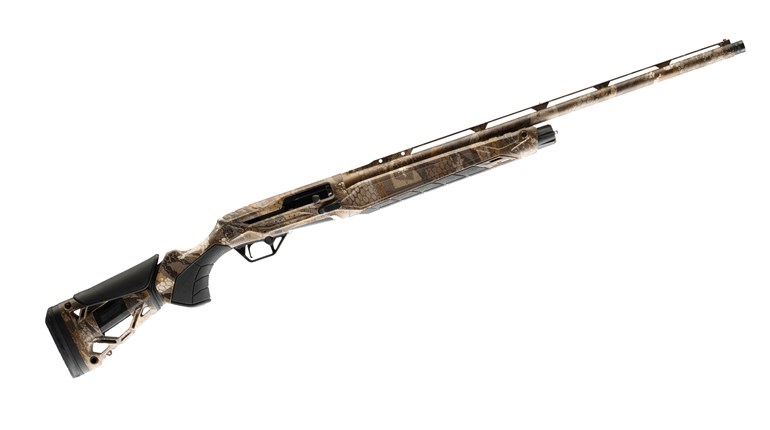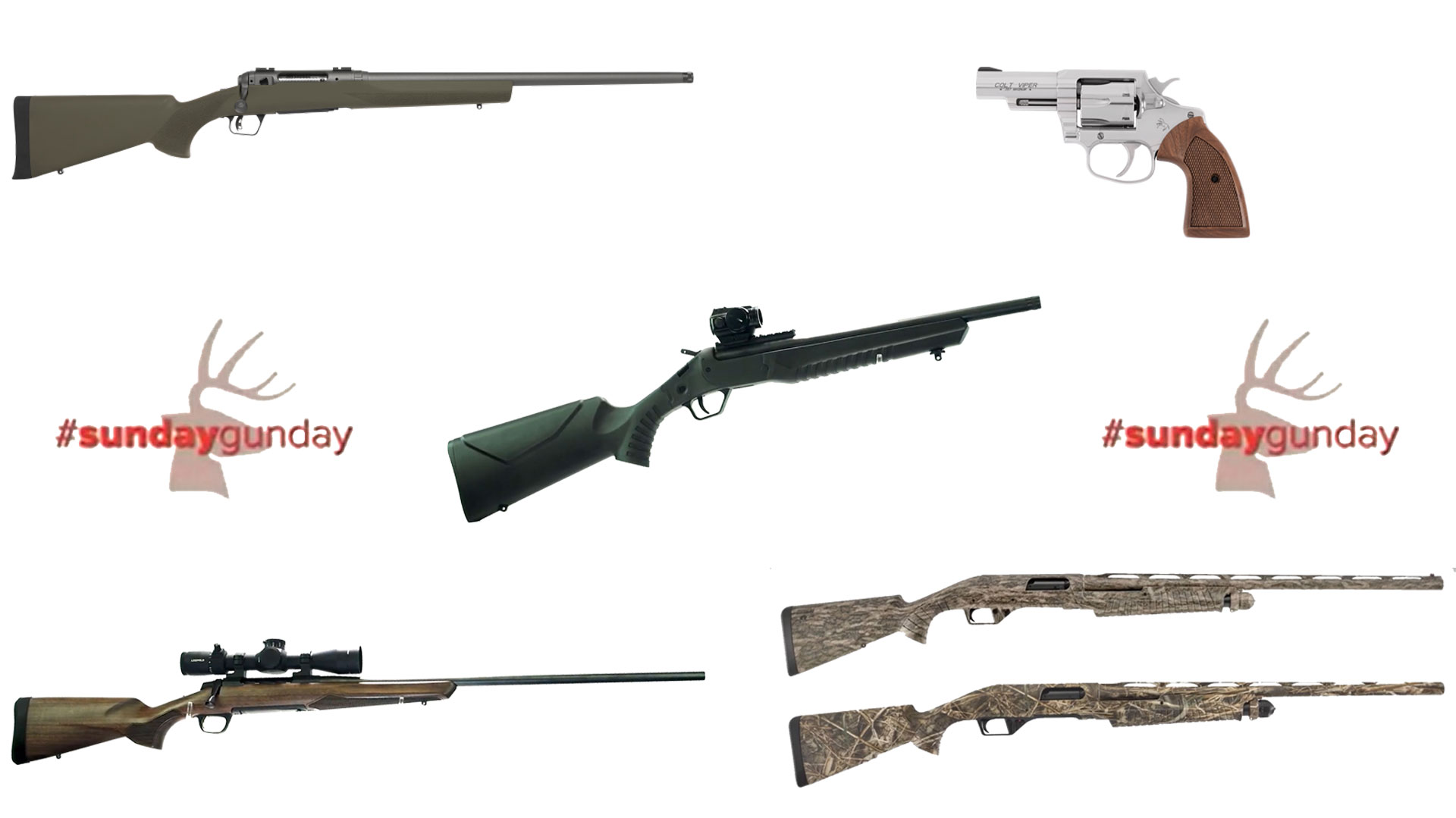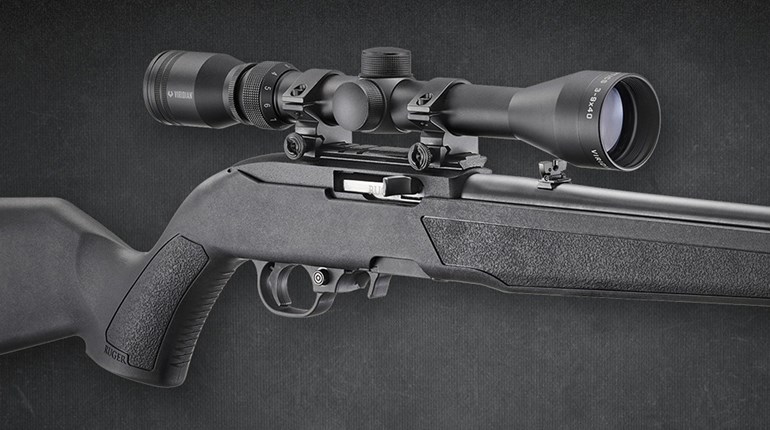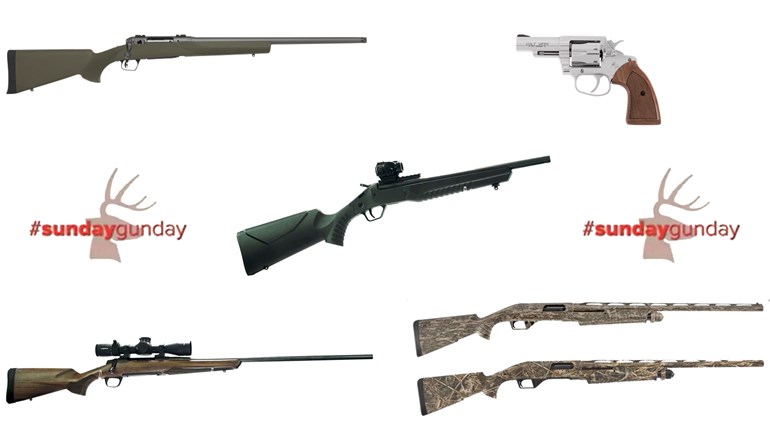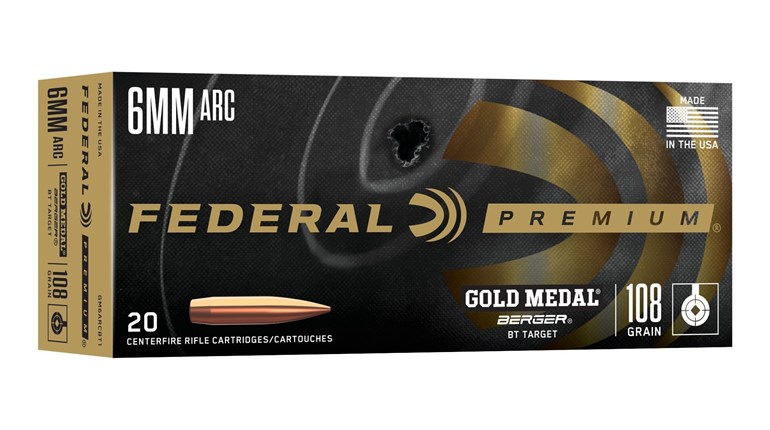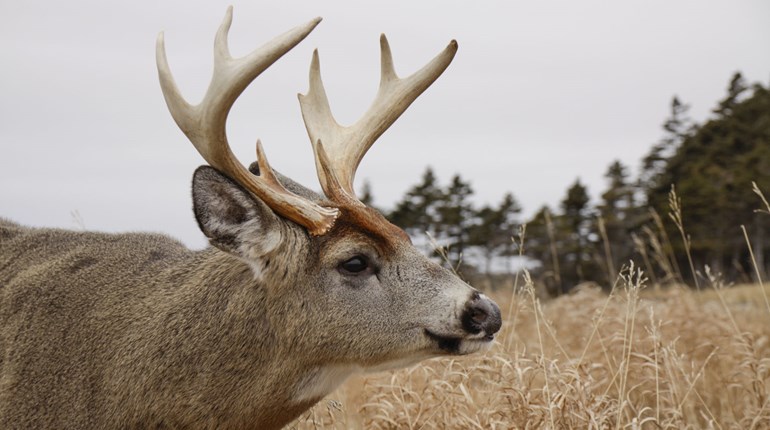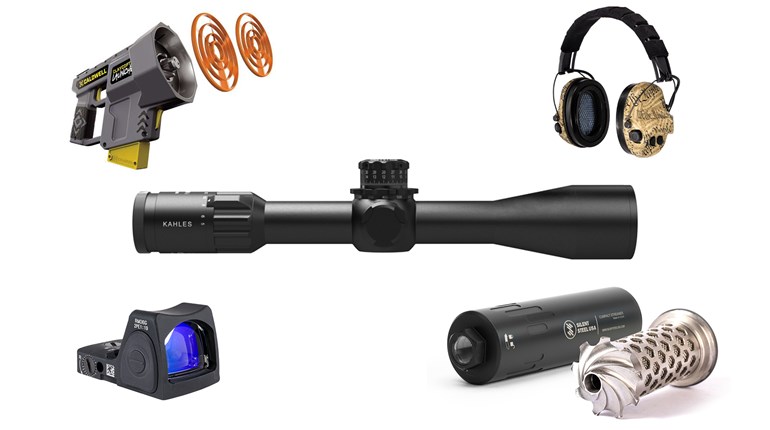The Natural Bridge transcends time and generations. This geological wonder in Virginia's Rockbridge County spans Cedar Creek where it crosses old Highway 11 and looks as though it's been forged by heavenly hands. Lauded by Native Americans, it was surveyed by George Washington and later purchased by Thomas Jefferson in 1774. Jefferson described it as "the most sublime of nature's works."
I hunted a special buck near there for one day last October, and while replaying the day's events in my mind as I drove home, I felt a sense of heightened spirituality. Maybe it occurred naturally, just like the bridge. Or maybe the hunt, or perhaps even the buck, was something more.
What follows is a true story.
It is pushing 11 p.m. by the time I take up the bloodtrail. A part of me feels guilty for even being back in the woods when I probably should be at the Jeffer's house near the phone. Regardless, my heart leaps when I discover the animal's blood, thick and crimson, as real and as beautiful as life but also as morbid as we commonly believe death to be. Yet moments later my stomach flips when the trail diminishes to a trickle. Oh, I want this buck—for Don, for me and for the buck itself. But another part of me doesn't want to find it at all.
■■■
Twenty-four hours earlier, Don Jeffer grasped my hand warmly, welcoming my girlfriend, Stephanie, and me into his country home. Don's home was not lavish, but it was built exactly as he wanted it: open and bright, on a hill with an elevated porch overlooking acres of cropland that gently rolled into the James River teeming with fish. Tall and handsome with skin dappled from a majority of 82 years spent under a sportsman's sun, Don was a standout basketball player in his youth before any three-point lines were painted. A New York ad man back in the heyday of print journalism, he'd long since retired to his west-central Virginia farm where he lived with his wife, Jeanette, near a clan of grandkids. The front porch light made his eyes sparkle like the moonlit crystals on the frosty cornstalks below.
I was somewhat surprised he was still up—after all it was bedtime before Stephanie and I could get off work and haul three hours down Interstate 81. But Don relished company, and as usual he wasn't wasting any time. By midnight we were still immersed in hunting stories and laughter.
"If you're going hunting, dear, you've got to let them get some sleep," said Jeanette, finally. "There's time to talk tomorrow." Don smiled knowingly, but politely finished his story.
Though modest trophies on Don's walls revealed worldly travels, it was obvious he'd been anticipating this, our annual bowhunt. Our mutual hunting buddy, Hank Tassitano, who spanned the generational gap between Don and I, said Don had called him several times to talk deer and confirm dates. I'd been waiting for the hunt, too, as I did each October when the air turned crisp and the acorns began dropping like omens from sun-battered oaks. Deer were on the move, and we all had a good feeling. How could any hunter not?
"Why don't you get up early and go to your spot," said Don, "and come back at 8 so I can show you around. I've seen a big buck, and I want to show you a new stand for tomorrow evening."
This from Don was odd, because traditionally I'd go to my stand just behind the house where I wouldn't disturb much; Hank would sit high on the mountain and Don would get in one of his stands in a crop field below. We'd all meet back at the house mid-morning. Climbing down from my stand at 8 was not ideal for success, but so be it. After all, this hunt was never about killing but rather about enjoying the company. In six years I'd only taken a couple does.
"Sure, Don," I said. "I'll see you back here at 8."
"Good night," said Don. And with that we retired to our quarters.
■■■
The blood is sometimes steady, sometimes marginal, and so like a runaway train its outcome cannot be predicted. Fact is, I've made a poor shot, and I've begun questioning the very reason why I hunt. Yet I am bound by the hunter's code to follow the buck that is headed to the James. Across it is private property where I can follow no more. How will I tell Don?
■■■
Morning arrived after a hair's whisk across the pillow. As I stepped outside into the cool darkness of dawn, however, I felt something different all around me. It was in the sky, so divinely clear, with stars layered upon stars. I felt the touch of a hunter's wind, light yet consistent; I felt it in the leaves of swaying oaks heavy with mast; in the stalks of swishing corn; I felt it in my soul.
Deer were everywhere. I could've taken a doe at first light, but I held off to enjoy the show. I watched two small bucks spar and two decent bucks cruise. The oaks were raining green acorns and the deer knew it. I felt it was only a matter of time. But soon my watch read 7:50, so I slipped down and trudged up the hill and into the house. Don, Jeanette and Stephanie were drinking coffee and enjoying the view.
"See any?" Don asked, his smile revealing he already knew the answer.
I relayed my glorious morning, and then Don suggested he drive me around the farm. Though I'd seen Don's land plenty, I humored him and hopped in the passenger seat of his Mule.
I noticed Don's stand hundreds of yards before we arrived. It was a fairly typical wooden box blind that sat on stilts in the corner of a food plot, and though I'd seen it before, it was different this time. Don looked at me to see if I noticed. It was a simple modification made with his son's help, and I could tell it made him happy. The vertical ladder had been removed and replaced by a long wooden staircase with a handrail that made it easier for Don to enter. The gradually ascending steps were made of white pine that made the whole thing glow in the sunshine.
"I'll hunt here this evening," declared Don. "Hank will drop me off here, then you then he'll go to his. This way we'll get to hunt together."
"Sounds good," I said.
"Now let's go see your stand," he said. "We saw one of the biggest bucks we've ever seen on the farm a few weeks ago—a non-typical 13-point—and I think he'll be in there."
We puttered up to the little mountain trail and Don pointed to a very average-looking ladder stand in the thick woods. There was no food plot, corn feeder or major trail near it.
"Climb on up," urged Don.
"I'm sure it's great," I said as politely as I could. If I was going to sit there that evening, I wanted it disturbed as little as possible. But Don insisted.
When I climbed up I noticed a perfect wind that brought the whistle of a passing locomotive to my ears. The railroad tracks were only a couple hundred yards below the stand. I hurried down so the train's noise would mask my exit. Though the odds suggested none of us would ever see the buck again, if anyone did I hoped it'd be Don. He'd had some health problems lately, and though he was getting around at the moment, Hank had confided in me that he didn't know how many more hunts Don had left.
■■■
I've followed Don's plan and it's led me here—to blood-covered railroad tracks at midnight while my friends need me elsewhere. What good is it? Perhaps I can't understand it yet. With waning faith I continue dogging the crimson path into the unknown.
■■■
Back at his house at noon, Don insisted he treat the ladies for lunch at his favorite spot in the town of Natural Bridge, so he drove us to the Pink Cadillac where the waitresses didn't have to ask him what he wanted to eat. Hank was at a table waiting for us, and stories from years past turned an hour lunch into a time. Finally Don snatched the bill. It was time to go.
Hank, Don and I rode side-by-side-by-side in the Mule. Few words were spoken as we arrived at Don's stand. A hazy glare was cast over it as blinding sunlight struck the rising pollen from the disturbed crops. We helped Don up the staircase, sat him in his swiveling chair and cocked his crossbow. We whispered each other good luck and tip-toed back down the stairs. On the ground, I turned back to look up at him. Don smiled and gave a thumbs up.
Twenty minutes later I was in my stand, sitting, listening to the birds and feeling a cool October breeze upon my face. God knows I am not his most religious. But when I sit in a treestand and observe nature around me—insects and flowers, trees and birds, and squirrels and sun and deer—I can't help but think that there may be a grand meaning to it all. For me, the woods transcends religion; it helps bridge the confusing span between mortality and spirituality. I had this notion just as I heard a rustle ahead to my left.
Without hesitation, I stood.
Suddenly a buck—a big buck—appeared from the brush. He was at least 10 points, wide, and thick. At the limit of bow range, I contemplated threading an arrow through the foliage. I hoped maybe Don would get him, and so I decided to let the buck continue his mission-like walk. As soon as I did, I heard something else.
I saw legs then a massive body. Gnarly, white-colored antlers sprawled every direction. It was one of those bucks a hunter needn't bother studying. At 20 yards, he walked behind a tree, and I drew my Bowtech. My arrow flew with a muffled whip. I watched as the big buck scrambled through the woods and ran off down the mountain. I listened for a crash but heard none.
In my mind's eye I saw the arrow strike too far back. There was no excuse. I'd simply blown an easy shot, and I was sick to my stomach. At this point I hoped the deer was not the buck. Who was I, but a once-a-year friend to come in, hunt for a day, and waste this great creature for all?
■■■
The blood trail continues downhill, and my mind races ahead of it. If I'd made a clean shot, would the outcome be different?
■■■
As good hunting buddies do, Hank didn't ask questions when he picked me up; rather he waited for me to offer details as we motored to Don's stand.
It was odd that Don wasn't waiting for us with the door open. We called his name, but heard no reply. Clambering up, I found our beloved friend slumped in his chair. His eyes were closed, and he was soaked with sweat. His face was dun and pale. Thinking the worst,
I yelled his name. Don opened an eye slightly.
"What's wrong?" I asked frantically. Don tapped his chest. At once Hank and I carried him down the staircase and sat him in the ATV. Jeanette, a nurse for many years, would know what to do, so we raced him to his house.
On the way back Don regained full consciousness.
"Did you get him?" he asked me, in a whispery voice.
"I shot a nice deer," I said, being purposefully vague. "But let's get you fixed up and I'll tell you all about it." I didn't want to excite him, but I also wanted to keep him talking. "Did you see anything?"
"Could've shot a great buck," said Don, "but watched instead." No doubt it was the big buck I'd seen heading his way. I wondered why he didn't shoot.
By the time the EMTs arrived, the color in Don's face had returned. We wanted him to rest but he just wanted to joke and talk about the hunt. I held his hand, and assured him I'd tell him all about the deer as soon as he returned from testing. The truth was I knew nothing about the deer—I didn't even know if it was the deer—and I certainly didn't know if I'd find it. But I couldn't worry him then. Don looked content laying there is his old-school camo jacket, even as they wheeled him out.
Stephanie and I stayed at the house to answer the phone while Hank and Jeanette followed the ambulance. They weren't fully out of the drive before I had my flashlight ready. I thought it was the best decision, and looking back, it was. I thought Don would want to know. Fifteen minutes later we were in the woods, kneeling over blood. And this was where life's paths converged.
■■■
 As I follow blood toward the railroad, I am overwhelmed by a horrible thought: If I don't find the deer, Don will live, and if I find the deer, Don will die. But this, I realize, is not rational thought. No person, no deer has any bearing on another man's life.
As I follow blood toward the railroad, I am overwhelmed by a horrible thought: If I don't find the deer, Don will live, and if I find the deer, Don will die. But this, I realize, is not rational thought. No person, no deer has any bearing on another man's life.
As the trail crosses the fence, I notice it goes up the rocky railroad berm. Just then I hear the frightening rumble of the train as it makes the mountain corner.
Oh no! It is possible the buck died from the effort climbing the berm, and it could be in the middle of the tracks. Maybe I killed the deer, but it will be forever lost! When the train finally passes, Stephanie and I scamper up the berm: Blood continues over both tracks and into the river bottom beyond.
As we cross a brushy fence, following sparse blood in the dying beam of my flashlight, I wonder how Don is doing. And just then, I trip on something in the middle of the trail. It is the buck. The noble animal is stone dead, facing the way he'd come.
I kneel down, pat his shoulder and thank him. I look toward the sky and, however pathetically, try to convey to something or someone how thankful I am for this animal's life. Stephanie gives me a Boone & Crockett-sized hug. Immediately I call Hank on my cell phone.
"How's Don?" I ask, as soon as he answers.
"He's doing better," says Hank. I exhale relief. My crazy thoughts were wrong. Everything will be fine.
"Don wants to know if you got him," says Hank.
"Yes, sir," I say. "Tell him he's right here."
"Is it him for sure?"
"This one's got 13 heavy points!" I say, counting them. "It's him."
"Don's smiling," says Hank. "He says he's happy!"
"I'll see you guys in a while," I say. "Bye now."
"Don says goodbye," says Hank.
Back at Don's house, I cook dinner and wait for everyone to get back. But no one returns. Sometime in the middle of the night, I awake to a knock on my bedroom door. It is Hank.
"Jeff," he says, cracking the door. Light floods my eyes, and all is dreamy like the halo around Don's stand that evening. "Don passed away a couple hours ago."
■■■
Early the next morning, still in disbelief, I walked outside to feel the sun and breeze melding over Natural Bridge, causing the frost crystals on the tall grass to wave like a carpet of diamonds. There were deer feeding in the corn, birds chattering and a blanket of fog rising over the river. There, in the Mule, was my buck—our buck—still in rigor. It snapped me to reality.
Don was gone. And yet, all was peaceful.
Over coffee we talked with Jeanette somberly. Sure, I'd just lost a hunting buddy, but she'd just lost her provider, her mate, her loving husband of 54 years.
"Don didn't go the way I would have liked him to," she said with tears welling. "But he went exactly the way he wanted to." She looked at me and searched my soggy eyes. Then she added: "You know that deer stand he built?"
"You mean the one he sat in last night?" I asked.
"Yes," she said. "He named it the ‘Stairway to Heaven Stand' a couple weeks ago."
■■■
One year later, I can't be sure if there is any meaning to what happened, but I have faith that there is. It's not about me, a deer or hunting, but rather about something more sublime, something that transcends time, generations and humanity on Earth. I believe Don planned that special day. I was just lucky to be invited. Indeed, I was fortunate to have known Donald Jeffer, if only for a time, and I thank him for helping me find a path through an often dark woods.
In May 2014, the Natural Bridge was deeded to the commonwealth of Virginia, and Gov. Terry McAuliffe made it a state park. Chances are Jeanette will sell the farm, as she simply can't handle the upkeep without Don. But the James River will flow, and the bridge that transcends all of us and guides us toward betterment will live on at the old Jeffer farm, if not tangibly then always in spirit.
The most sublime of nature's works may be those we can't fully grasp. Don showed me there are natural bridges that span points commonly thought impassable. And when mortals find them, we should rejoice. Happy hunting, my friend.













